![]()
| Tom Petty 1950-2017 |
|
![]()
For more than 40 years, the rocker made music that was pure America through and through.
By Eric Renner Brown in Entertainment Weekly
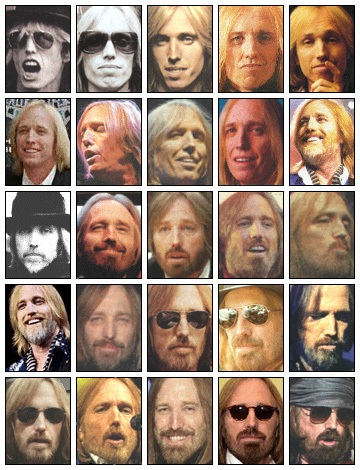
![]() e're just gonna throw a bunch of records up in the air and see where they fall tonight," Tom Petty told the crowd at the Hollywood Bowl during the penultimate performance of his career on Sept. 22. Like the rest of the dates on the 40th-anniversary tour he staged this year with the Heartbreakers, Petty's string of three shows in late September felt a lot like the best classic-rock radio station you could imagine: packed with hit after hit, rendered vividly by Petty's grizzled twang and the nimble playing of his longtime bandmates.
e're just gonna throw a bunch of records up in the air and see where they fall tonight," Tom Petty told the crowd at the Hollywood Bowl during the penultimate performance of his career on Sept. 22. Like the rest of the dates on the 40th-anniversary tour he staged this year with the Heartbreakers, Petty's string of three shows in late September felt a lot like the best classic-rock radio station you could imagine: packed with hit after hit, rendered vividly by Petty's grizzled twang and the nimble playing of his longtime bandmates.
By all accounts, the tour was a triumph -- and a jovial Petty seemed to have plenty of gas left in the tank during the Bowl gigs. He affably chatted with the crowds, recalling his humble origins in Gainesville, Fla., and sending well wishes to hurricane victims in Texas and Florida. At 66, the freewheeling rock icon was chugging along with understated verve -- a quality he shared with the numerous foundational anthems he contributed to the rock & roll canon across his acclaimed multidecade career.
So when news broke on Oct. 2 that Petty was on the verge of death after going into cardiac arrest at his Malibu home, it took many by surprise. And for a few hours, it appeared he might pull through -- the LAPD quashed initial reports of his passing. Hours later, the worst was confirmed: Petty died at UCLA Medical Center at 8:40 p.m.
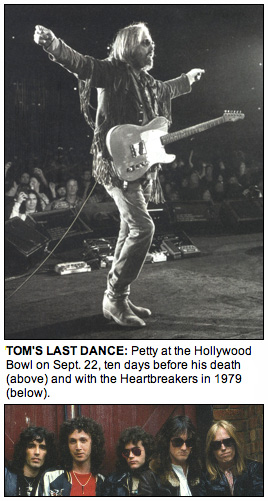 Petty checked pretty much every box imaginable for a rock star, from his 2002 Rock and Roll Hall of Fame induction to the 2008 Super Bowl XLII halftime show. But his pure Americanness -- the way his melodies seeped into barbecues and long car rides -- set him apart. "He's very much in the American grain," director Peter Bogdanovich, who helmed 2007's four-hour Petty doc Runnin' Down a Dream, says. "He's what I'd call an American original. His music doesn't remind me of anybody -- it just reminds me of Tom Petty."
Petty checked pretty much every box imaginable for a rock star, from his 2002 Rock and Roll Hall of Fame induction to the 2008 Super Bowl XLII halftime show. But his pure Americanness -- the way his melodies seeped into barbecues and long car rides -- set him apart. "He's very much in the American grain," director Peter Bogdanovich, who helmed 2007's four-hour Petty doc Runnin' Down a Dream, says. "He's what I'd call an American original. His music doesn't remind me of anybody -- it just reminds me of Tom Petty."
Born Oct. 20, 1950, in Gainesville, Petty faced adversity -- his father, Earl, often beat him, according to 2015's Petty: The Biography by Warren Zanes -- and sought refuge in rock's first wave. When Petty was 10, his uncle, who worked in the film industry, introduced the youngster to Elvis Presley, who was on location in Florida filming 1962's Follow That Dream. The encounter piqued Petty's interest in rock, and the following year he got his first guitar. He said watching the Beatles on The Ed Sullivan Show in 1964 inspired him to one day form a band, and as a teen he took lessons from future Eagles guitarist Don Felder.
Petty gigged throughout Gainesville as an adolescent, and first encountered moderate success after forming Mudcrutch in 1970. The group found regional popularity but floundered after relocating to Los Angeles. Once the band dissolved in 1975, Petty recruited fellow Mudcrutchers Mike Campbell and Benmont Tench, along with Ron Blair and Stan Lynch, to form his most famed group, the Heartbreakers. (Howie Epstein joined in 1982.)
Success was swift. After releasing their eponymous debut in 1976 and 1978's You're Gonna Get It!, the group's next four albums soared into Billboard's top 10 and yielded singles like Refugee" and "Don't Come Around Here No More." But fame and wealth didn't corrupt Petty. When his record label suggested boosting the price of 1981's Hard Promises, from the standard $8.98 to a "superstar" $9.98, Petty refused -- and threatened to title it The $8.98 Album. "That song, 'I Won't Back Down,' that's Tome," Bogdanovich says. "He had extraordinary integrity. Money wasn't the issue."
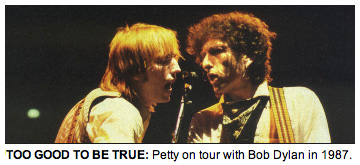 By the mid-'80s, Petty had ascended into rock's upper echelon, collaborating with the likes of Bob Dylan and the Grateful Dead, and was a member of supergroup the Traveling Wilburys, featuring Dylan, George Harrison, Roy Orbison, and Electric Light Orchestra's Jeff Lynne. With Lynne, Petty his a mid-career peak. His solo debut, 1989's Full Moon Fever, co-written with Lynne, hit No. 3 on the albums chart and spawned three seismically popular singles: "I Won't Back Down,' "Runnin' Down a Dream," and, most famous of all, "Free Fallin'." "Tom Petty was the coolest guy I ever knew," Lynne said in a statement.
By the mid-'80s, Petty had ascended into rock's upper echelon, collaborating with the likes of Bob Dylan and the Grateful Dead, and was a member of supergroup the Traveling Wilburys, featuring Dylan, George Harrison, Roy Orbison, and Electric Light Orchestra's Jeff Lynne. With Lynne, Petty his a mid-career peak. His solo debut, 1989's Full Moon Fever, co-written with Lynne, hit No. 3 on the albums chart and spawned three seismically popular singles: "I Won't Back Down,' "Runnin' Down a Dream," and, most famous of all, "Free Fallin'." "Tom Petty was the coolest guy I ever knew," Lynne said in a statement.
Though he saw continued professional success, he also endured personal turmoil: In 1996, Petty and his wife of 22 years, Jane Benyo, with whom he had two children, divorced; and he also struggled with heroin, the biography revealed. (He got clean and in 2001 wed Dana York; they remained married until his death.)
Petty entered the new millennium as one of rock's most revered legacy acts, headlining festivals like Bonnaroo and releasing new albums. And though he'd hinted that the 40th-anniversary tour would be his last big trek, he expressed no interest in retirement -- and his gratitude for his fans never wavered. "I want to thank you for 40 years of a really great time," he told his last-ever crowd at the Hollywood Bowl on Sept. 25, before performing the final song, 1976's "American Girl." As the Heartbreakers trickled off stage, true to form, Petty lingered, signing autographs for fans in the front row.
NORAH JONES REMEMBERS TOM PETTY
Tom Petty had a way of embedding songs in your DNA. He just cranked out musical masterpieces that went completely into the heart of everybody in this country. You could hear his rock & roll anthems at the bar and everyone would sing along. I started doing Tom Petty tribute shows around 15 years ago. Paying tribute to a living person is a testament to how beloved his music is. I had heard through the grapevine that he kept up with the tribute shows, that he watched stuff online. It tickled him that people loved his music. So when I met him in February during the MusiCares "Person of the Year" dinner honoring him, I was excited to tell him how much I loved him. I told him, "We should jam sometime!" And he said, "Sure!" I can't believe I said that to Tom Petty. But he was super sweet. He just did whatever he wanted to do, and that's the kind of artist you aspire to be. When you follow your heart, it shows. - as told to Nolan Perry
Jones is a nine-time Grammy award winner and frequent Petty Fest performer. ![]()
|
"FREE FALLIN'" (1989) No one captured the unadorned poetry of ordinary lives quite like Petty, and this may be his loved-her-and-left-her masterpiece. |
"AMERICAN GIRL" (1976) An enduring ode to big dreams, bruised hearts, and (oh yeah, all right) take-it-easy babies, built on one of the most famous opening riffs in rock & roll. |
"DON'T COME AROUND HERE NO MORE" (1985) There's a reason for all the synths: Eurythmic Dave Stewart co-wrote this shimmering plea to be left alone by a no-good lover. |
"MARY JANE'S LAST DANCE" (1993) MTV kids knew it as the one with corpse bride Kim Basinger being dragged through one final freaky waltz. But Petty's harmonica-laced storytelling stands alone. |
"REFUGEE" (1980) Not actually about immigration; just Petty's defiant take (or so he once claimed) on the ruthlessness of the music industry. |
|
"HANDLE WITH CARE" (1988) A bittersweet road-dog gem from his time in pop's starriest supergroup, the Traveling Wilburys. |
"YOU DON'T KNOW HOW IT FEELS" (1994) Radio censored the chorus line "Let's roll another joint" but couldn't wreck this triumph of lean lone-wolf songcraft. |
"STOP DRAGGIN' MY HEART AROUND" (1981) With duet partner Stevie Nicks, a rueful pas de deux between lovers too far gone for easy goodbyes. |
"I WON'T BACK DOWN" (1989) The supreme stand-and-deliver anthem (and yeah, that's George Harrison singing backup). |
"INTO THE GREAT WIDE OPEN" (1991) A classic cautionary tale, paired with a video starring Johnny Depp as the aspiring rock star and "rebel without a clue" whose downfall was as sure as Petty's pitch-perfect sense of melody. |

| Robert Plant's Worldy Blues |
|
![]()
Grab your passport: The Led Zeppelin frontman is drawing on musical traditions
from around the globe on his politically charged new LP, 'Carry Fire'.
By Eric Renner Brown in Entertainment Weekly
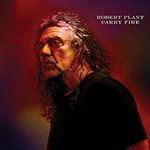
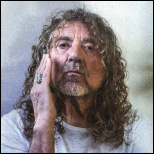
![]() rom Led Zeppelin's psychedelic blues to his 2007 Grammy-winning folk collaboration with Alison Krauss, Robert Plant has built his career on a deep reverence for American roots music. So it's fascinating that Carry Fire (out now), his stellar 11th solo album, encompasses sounds far outside the American canon. Credit that in part to the extracurricular activities of his live band, who bring ideas and influences whenever Plant summons them to record. "Everybody goes off and works on other projects and comes back to this home," he says. "It cold be called a mothership."
rom Led Zeppelin's psychedelic blues to his 2007 Grammy-winning folk collaboration with Alison Krauss, Robert Plant has built his career on a deep reverence for American roots music. So it's fascinating that Carry Fire (out now), his stellar 11th solo album, encompasses sounds far outside the American canon. Credit that in part to the extracurricular activities of his live band, who bring ideas and influences whenever Plant summons them to record. "Everybody goes off and works on other projects and comes back to this home," he says. "It cold be called a mothership."
Yet whether he's teaming up with Massive Attack's John Baggott and channeling the "dark techno keyboard loop mongers" of '90s Bristol or working with guitarist Justin Adams to recall Malian folk of Ali Farka Touré, Plant says his approach is unchanging: "It's all the same, really, just people letting it out."
And on Carry Fire, there's plenty to let out. The set is one of Plant's most political bodies of work to date, touching on topics including imperialism ("Carving Up the World Again... a wall and not a fence") and immigration ("New World..."). Still, it's not a totally bleak affair. Consider the scintillating rendition of Ersel Hickey's romantic 1958 folk tune "Bluebirds Over the Mountain," for which Plant recruited the Pretenders' Chrissie Hynde. "I sent her a copy of what we were doing, and she was enthralled," he says. "She said, 'So the great psychedelic dream comes alive again!' I drove out, picked her up in my car, and we went off to the studio. It's nice -- a sort of psychedelic Sonny and Cher." ![]()
![]() Reader's Comments
Reader's Comments
No comments so far, be the first to comment.
